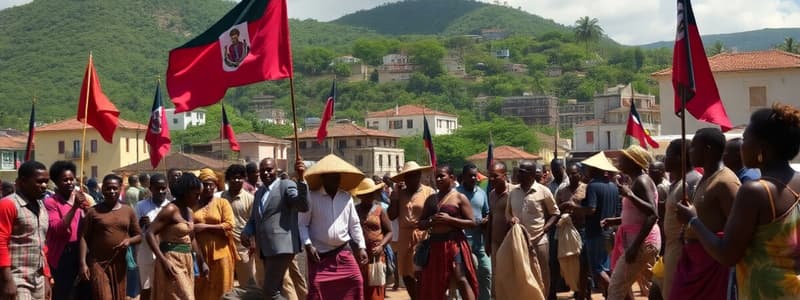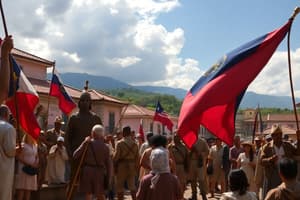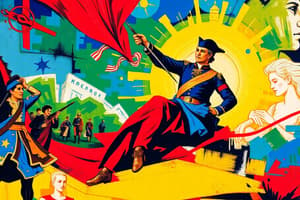Podcast
Questions and Answers
Who initiated the first major call for independence in Mexico in 1810?
Who initiated the first major call for independence in Mexico in 1810?
- Agustin de Iturbide
- Jose Maria Morelos
- Miguel Hidalgo (correct)
- Juan de la Cruz
What was the composition of the army that followed Hidalgo during the uprising?
What was the composition of the army that followed Hidalgo during the uprising?
- Spanish military and creoles
- Hidalgo and his Indian and mestizo followers (correct)
- Only mestizos
- Only creoles
What significant event threatened the privileges of the creoles in Mexico in 1820?
What significant event threatened the privileges of the creoles in Mexico in 1820?
- An economic crisis in the colony
- The rise of indigenous leadership
- A revolution in Spain that brought liberal leaders to power (correct)
- The formulation of a new constitution
Which leader took over the revolutionary efforts after Hidalgo's defeat in 1811?
Which leader took over the revolutionary efforts after Hidalgo's defeat in 1811?
What ironic twist occurred in 1821 regarding Agustin de Iturbide's role in Mexico's independence?
What ironic twist occurred in 1821 regarding Agustin de Iturbide's role in Mexico's independence?
Which group had the highest proportion of the Spanish colonial population?
Which group had the highest proportion of the Spanish colonial population?
Which group was likely to hold the most power and wealth in Spanish colonial society?
Which group was likely to hold the most power and wealth in Spanish colonial society?
What prompted the colonists in Latin America to pursue freedom from European rule in the late 1700s?
What prompted the colonists in Latin America to pursue freedom from European rule in the late 1700s?
Which group in Spanish colonial society was considered to be at the bottom of the social hierarchy?
Which group in Spanish colonial society was considered to be at the bottom of the social hierarchy?
Which group held the highest positions in the governance of Spanish colonial societies in Latin America?
Which group held the highest positions in the governance of Spanish colonial societies in Latin America?
What significant event inspired colonists in Latin America to seek independence from European powers?
What significant event inspired colonists in Latin America to seek independence from European powers?
Which historical figure is known for leading independence movements in South America?
Which historical figure is known for leading independence movements in South America?
What common sentiment among Latin American peoples contributed to the push for independence?
What common sentiment among Latin American peoples contributed to the push for independence?
What shared philosophical movement inspired independence movements in Latin America?
What shared philosophical movement inspired independence movements in Latin America?
In the social hierarchy of colonial Latin America, which group was ranked just below the peninsulares?
In the social hierarchy of colonial Latin America, which group was ranked just below the peninsulares?
Which two European countries held the largest colonial empires in Latin America in 1800?
Which two European countries held the largest colonial empires in Latin America in 1800?
Which independent countries emerged by 1830 from Spanish territory in the Americas?
Which independent countries emerged by 1830 from Spanish territory in the Americas?
What was the name of the region that included several Central American states before the Mexican revolution?
What was the name of the region that included several Central American states before the Mexican revolution?
What major event happened in Central America in 1821?
What major event happened in Central America in 1821?
How did Brazil's quest for independence differ from other Latin American countries?
How did Brazil's quest for independence differ from other Latin American countries?
Flashcards
Mestizo
Mestizo
A person of mixed European and Native American ancestry in Spanish colonial society.
Mulatto
Mulatto
A person of mixed European and African ancestry in Spanish colonial society.
Peninsular
Peninsular
A Spanish person born in Spain, holding high-ranking positions in colonial society.
Creole
Creole
Signup and view all the flashcards
Social Hierarchy in Spanish Colonies
Social Hierarchy in Spanish Colonies
Signup and view all the flashcards
Latin American Independence Movements
Latin American Independence Movements
Signup and view all the flashcards
Enlightenment Influence
Enlightenment Influence
Signup and view all the flashcards
Revolution Inspiration
Revolution Inspiration
Signup and view all the flashcards
New Spain
New Spain
Signup and view all the flashcards
Central America
Central America
Signup and view all the flashcards
Brazil's Royal Liberator
Brazil's Royal Liberator
Signup and view all the flashcards
Central American Independence
Central American Independence
Signup and view all the flashcards
Grito de Dolores
Grito de Dolores
Signup and view all the flashcards
Padre Morelos
Padre Morelos
Signup and view all the flashcards
The Spanish Revolution of 1820
The Spanish Revolution of 1820
Signup and view all the flashcards
Agustin de Iturbide's Role in Mexican Independence
Agustin de Iturbide's Role in Mexican Independence
Signup and view all the flashcards
Study Notes
Latin American Independence
- Latin American peoples, inspired by discontent and Enlightenment ideals, fought colonial rule.
- Sixteen modern Latin American nations gained independence during this time period.
- Colonial society was divided by class, with peninsulares (people born in Spain) at the top, followed by creoles (Spaniards born in Latin America), mestizos (mixed European and Indian ancestry), mulattos (mixed European and African ancestry), and enslaved Africans.
- Peninsulares held the most powerful positions in government.
- Creoles could not hold high-level political office but could rise to military leadership.
- Indians and mestizos comprised the majority of the population.
- The American Revolution, French Revolution, and Enlightenment ideas promoted liberty, equality, and democratic rule, inspiring movements for independence.
Haitian Revolution
- Saint Domingue (present-day Haiti), was the first Latin American territory to gain independence from European rule.
- It was the first successful slave revolt in history, led by Toussaint L'Ouverture.
- The enslaved population greatly outnumbered the French masters.
- In 1791, 100,000 enslaved Africans revolted.
- Toussaint L'Ouverture rose to become a skilled general and diplomat, eventually taking control of the entire island and ending slavery.
- In 1802, French troops attempted to retake the island, but Toussaint was captured and died in prison.
- Jean-Jacques Dessalines continued the fight for independence.
- Haiti declared independence on January 1, 1804.
- It was the first black colony to free itself from European control.
Creole Leadership
- Creoles, though less oppressed than other groups, aspired to political power.
- Many creoles were educated in Europe and exposed to Enlightenment ideas.
- The removal of the Spanish king Ferdinand VII by Napoleon sparked revolts in Spanish colonies, as creoles felt no loyalty to a French-imposed monarch.
- Revolts for independence broke out in 1810.
Simón Bolívar and José de San Martín
- Simón Bolívar, a Venezuelan creole general, successfully led revolutionary efforts in Venezuela, Colombia, and other territories.
- José de San Martín, an Argentinean general, led efforts in Argentina, Chile, and Peru.
- Collaboration between San Martín and Bolívar was crucial in achieving independence for many South American countries.
Mexican Revolution
- Padre Miguel Hidalgo, a priest, initiated the Mexican independence movement in 1810 with the "Grito de Dolores."
- Following Hidalgo's defeat, Padre José María Morelos continued the fight before being defeated in 1815.
- Agustín de Iturbide, a creole officer, declared Mexican independence in 1821.
- Ethnic and racial mixing in Mexico led to Indian and mestizo participation in the revolution.
Brazil's Royal Liberator
- Brazil's independence occurred without major violence.
- The Portuguese royal family fled to Brazil in 1807 and made the colony the capital of the empire.
- After Napoleon's defeat in 1815, the Portuguese returned to Portugal, but their son, Dom Pedro, remained in Brazil.
- In 1822, Dom Pedro declared Brazil's independence.
- This avoided major conflict and bloodshed.
European Revolutions
- Conservative, liberal, and radical philosophies influenced European politics.
- Conservative groups wanted to preserve traditional monarchies.
- Liberal groups advocated for political reforms and elected parliaments.
- Radicals favored extending democracy to all people.
- Nationalism, a powerful force, further complicated these political divides. People felt greater loyalty to their nationality over their loyalty to their king, causing tension in countries with large ethnic groups.
Studying That Suits You
Use AI to generate personalized quizzes and flashcards to suit your learning preferences.




